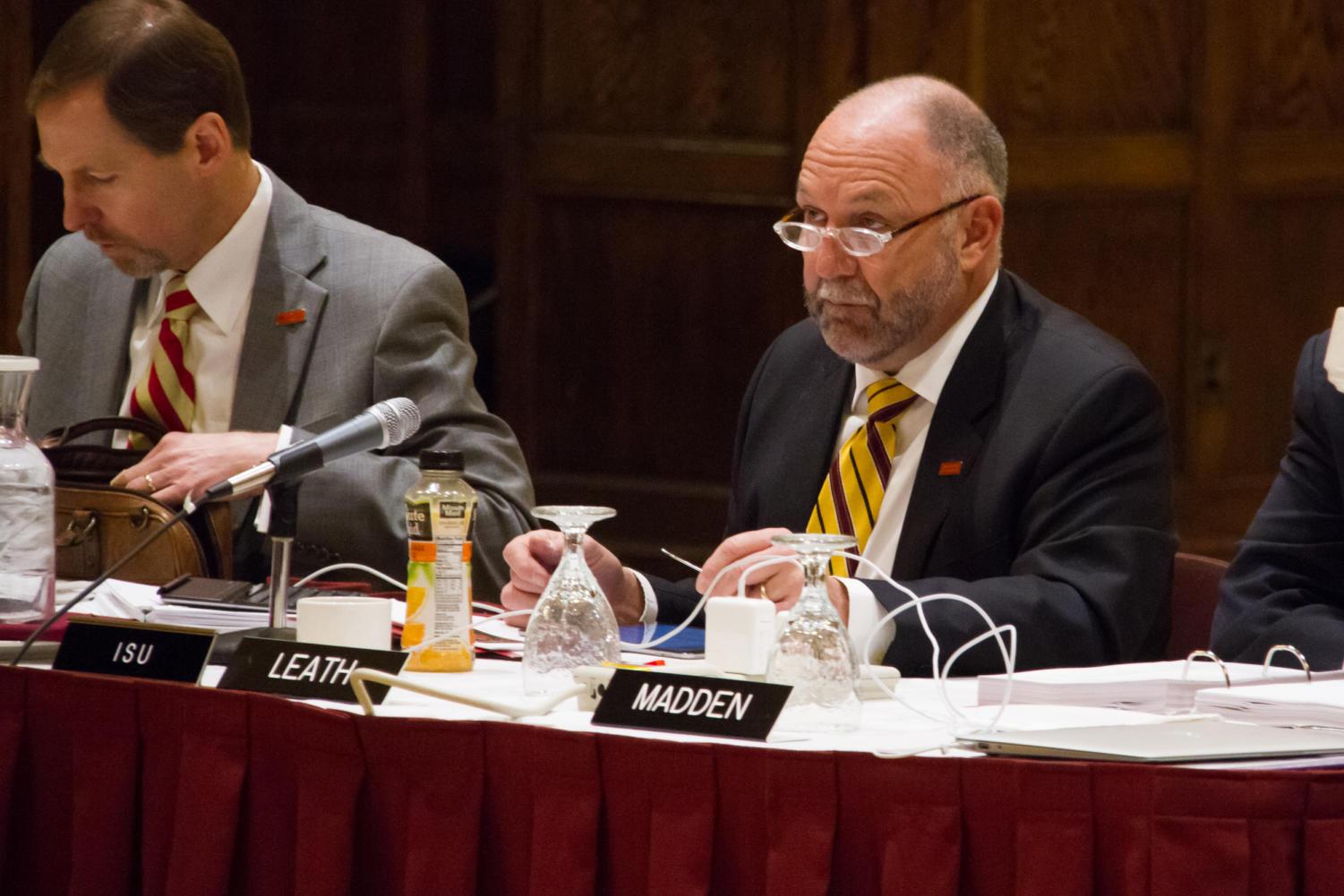Sinclair: Lower college tuition across the board
Iowa State University President Steven Leath listens to a result of an audit during a Iowa Board of Regents meeting in the Great Hall of the MU on Feb 25.
February 10, 2017
As a current college student, I understand the costs and benefits of going to college. It’s a big decision to make, but it is one that everyone should make.
Receiving a higher education is incredibly important, not just for the sake of individuals, but for the country as a whole. We all benefit when someone makes the choice to continue their education. But sometimes, other factors make this choice for people. The cost of college and high risk of debt associated with that cost can force people to forgo college, something that arguably benefits society as a whole.
Distinguishing what college exactly is to society is important in determining how we fund and operate these institutions. Is college a public good or a private good? A public is “a product that one individual can consume without reducing its availability to another individual, and from which no one is excluded.” These goods are described as “non-excludable” and “non-rivalrous,” and common examples of such goods are law enforcement, national security and sewage systems.
In the simplest of terms, public goods are products that should benefit everyone. Private goods are the exact opposite. A private good is “a product that must be purchased to be consumed, and its consumption by one individual prevents another individual from consuming it.” Only one person or group can use a private good, and it is usually produced to make a profit. Everyday examples include food, cellphones and cars.
In my opinion, college doesn’t directly fall in either of these categories. It straddles the line between being a public and private good, but it does tend to lean one way more than the other.
I argue that college slants more toward being a public good than a private good. While colleges operate as a business and often make large sums of money, their main purpose is to educate people.
Educating the masses benefits everyone by creating a more informed populous and giving people the chance to rise out of poverty. This is a key characteristic of a public good. Colleges benefit the individuals who attend, the community where they reside and businesses across the country by providing a highly-capable workforce.
Another important part of a public good is that it is non-excludable. One person going to college does not take away another person’s chances of going to college. Everyone is able to attend a university and no one is excluded, as long as they can afford it.
And that’s where people run into problems.
College is expensive. Many people run into trouble when trying to afford it, especially people living in poverty. There is a horrible cycle for people in this position. One of the clearest paths to escaping poverty is by receiving your college degree and getting a job.
A college education will benefit almost every individual in the long run, especially when you consider that someone earning a bachelor’s degree can expect to earn 66 percent more over a 40-year working life than someone with just a high school diploma, according to The College Board.
But the only way you will earn that beneficial degree is by being able to pay for tuition to a university — a tuition that many in poverty can’t afford, meaning they become stuck in an endless loop.
Even if you can afford college, the odds that you will need to take out a federal student loan are high. In 2015, 68 percent of college graduates had student loans, averaging $30,100 per borrower, according to the The Institute for College Access and Success. This is a daunting number for people who don’t have the support or resources to go to college. College is too expensive for everyday people, and it shouldn’t be.
That’s why college tuitions need to be lowered. With nearly $1.2 trillion in student loan debts, according to Forbes, it’s clear that people want to attend college but can’t afford it. Lowering the cost of tuition would allow a college education to become more feasible for everyone. Cutting costs wouldn’t be easy, and there would have to be government involvement in some form, but it will benefit society over the long run.
More people won’t have to take out federal loans, and more people will be able to improve their lives. College is a fundamental institution that everyone should be able to have access to. Going to college shouldn’t be decided for someone solely based on the fact that they cannot afford it. We need to create accessibility to higher education for everyone by lowering the cost of tuition.







